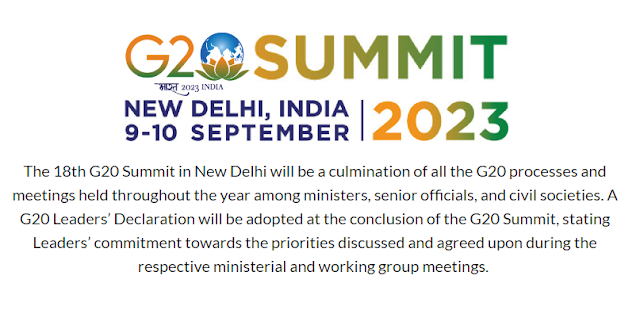Bharat's Incredible G20 Leadership: Shaping a Sustainable Future
In recent years, India's role in global politics and economics has taken center stage, and this prominence was particularly evident during its leadership of the G20 summit.
India's incredible leadership and contributions have not only demonstrated its ability to play a pivotal role in international forums but have also shown its commitment to shaping a sustainable future for the world.
In this article, we will delve into Bharat's (India's) remarkable leadership during the G20 summit, highlighting its positive impact and its vision for a better world.
The G20 and Its Significance
The Group of Twenty, or G20, is an international forum comprising the world's major economies. It was established in 1999 to address global economic challenges and promote international financial stability. Since then, it has evolved to encompass a broader range of issues, including climate change, sustainable development, and social equity.
The G20 comprises 19 individual countries and the European Union, representing over 80% of the world's economic output and two-thirds of its population. As such, the decisions made within this forum have a profound impact on global policies and the well-being of people worldwide.
India's Incredible G20 Leadership
India has taken on a leading role in the G20, the premier forum for international economic cooperation. As the chair of the G20 in 2023, India has set an ambitious agenda that includes addressing climate change, promoting sustainable development, and building a more resilient global economy.
Prime Minister Narendra Modi's performance as the G20 president has been praised by many, including world leaders and organizations.
A recent survey by the Pew Research Center found that 58% of Indians approve of Modi's handling of the G20 presidency, while 39% disapprove. The survey also found that 72% of Indians believe that the G20 summit was a success. India's millennials support PM Narendra Modi.
The popularity of Prime Minister Narendra Modi remains intact, as 52 percent of respondents say he is best suited for the top post, based on the recent India Today's Mood of the Nation poll. People in most nations of the G20 have a favorable view of India.
Modi's good G20 rating is a sign of his growing stature on the world stage. India is a rising power, and Modi's leadership in the G20 is a reflection of his commitment to global cooperation and his desire to play a leading role in shaping the global agenda.
India's leadership in the G20 has been praised by world leaders and organizations. The United Nations Secretary-General, António Guterres, has said that India is "playing a leading role in shaping the global agenda". The World Bank has also praised India's leadership, saying that it is "demonstrating its commitment to global cooperation".
Vasudhaiva Kutumbakam
"Vasudhaiva Kutumbakam" is the theme of India's presidency of the G20. It is a Sanskrit phrase that means "The world is one family." The phrase is a call for global unity and cooperation to address the challenges facing the world, such as climate change, sustainable development, and global health.
India's use of the phrase "Vasudhaiva Kutumbakam" is a way to emphasize the country's commitment to global cooperation. India is a rising power, and it is using its G20 presidency to play a leading role in shaping the global agenda.
The phrase "Vasudhaiva Kutumbakam" is a powerful reminder that we are all connected. It is a call to action to work together to create a better future for all.
Human-centric Globalization
G20 Leader, Prime Minister Narendra Modi has called for a "human-centric globalization" that puts people at the center of the global economy. He has argued that globalization should be used to improve the lives of all people, not just the wealthy and powerful.
Modi's human-centric globalization is based on the following principles:
- Inclusiveness: Globalization should benefit everyone, not just a select few.
- Sustainability: Globalization should be environmentally sustainable.
- Equality: Globalization should promote equality and social justice.
- Dignity: Globalization should uphold human dignity and rights.
Modi has called on countries to work together to create a more human-centric globalization. He has argued that this is the only way to ensure that globalization benefits everyone.
Bharat's Leadership in the G20
India assumed the presidency of the G20 for the first time in 2022, marking a significant milestone in its diplomatic history. Under the leadership of Prime Minister Narendra Modi, Bharat brought its unique perspective and priorities to the forefront of global discussions.
1. Sustainable Development and Climate Action
One of the defining themes of India's G20 presidency was its emphasis on sustainable development and climate action. India has been a vocal advocate for addressing climate change while recognizing the importance of equitable and inclusive development. During the summit, Bharat led discussions on climate finance, clean energy, and sustainable agriculture.
India's commitment to renewable energy was highlighted, particularly its ambitious target of achieving 50% renewable energy capacity by 2030. This commitment not only aligns with global climate goals but also serves as an example of how a developing nation can lead the transition to a sustainable future.
2. Inclusive Economic Growth
Inclusivity was another central theme of Bharat's G20 leadership. India stressed the importance of inclusive economic growth, particularly in the wake of the COVID-19 pandemic. The country's call for resilient and inclusive supply chains and its efforts to promote digital inclusion were well-received by G20 members.
Bharat's emphasis on addressing the economic challenges faced by developing nations, including access to vaccines and economic recovery, reflected its commitment to global solidarity and cooperation.
3. Digital Transformation
As the world rapidly embraces digital technologies, Bharat recognized the importance of harnessing the potential of digital transformation for economic growth and development. During its G20 presidency, India promoted discussions on digital governance, data privacy, and cybersecurity.
The country's efforts to bridge the digital divide and promote digital literacy were applauded. Bharat's Digital India initiative, which aims to empower its citizens through digital access and education, served as an inspiring model for other nations.
4. COVID-19 Response and Global Health
In the midst of a global pandemic, Bharat's leadership in the G20 was crucial in coordinating a collective response to COVID-19. India's efforts in vaccine production and distribution, including its commitment to supplying vaccines to other nations through the COVAX initiative, demonstrated its dedication to global health and equity.
Bharat's call for strengthening the World Health Organization (WHO) and improving pandemic preparedness received widespread support. Its emphasis on affordable and accessible healthcare underscored the importance of leaving no one behind in the fight against COVID-19.
5. Strengthening Multilateralism
Throughout its G20 presidency, India consistently advocated for the importance of multilateralism and international cooperation. It stressed the need for a rules-based international order and the reform of global institutions to better represent the interests of developing nations.
Bharat's support for the reform of the United Nations Security Council (UNSC) and the expansion of the G7 demonstrated its commitment to a more equitable and inclusive global governance system.
6. Strengthening the Global Financial System
India is working to make the global financial system more resilient to shocks and crises. India has been a strong advocate for reform of the international financial system. India has argued that the system is biased against developing countries, and it has called for reforms that would make it more equitable.
7. Enhancing Food Security
India is working to enhance food security by promoting agricultural productivity and reducing food waste.
India has made significant strides in ensuring food security for its citizens. In the past few decades, the country has made major investments in agriculture, irrigation, and food processing. These investments have helped to increase food production and improve access to food for all Indians.
India is now a major food exporter, and it is committed to helping other countries achieve food security. The country has been a strong advocate for the right to food, and it has worked with other countries to develop policies and programs to address hunger and malnutrition.
India's leadership during its G20 presidency is making an indelible mark on the forum and the global stage. Bharat's commitment to sustainable development, climate action, inclusive growth, and global health exemplified its role as a responsible and forward-thinking global leader.
As we reflect on Bharat's incredible G20 leadership, we are reminded that the challenges facing the world require collective efforts, visionary leadership, and a commitment to creating a better future for all.
India's legacy in the G20 serves as an inspiration for nations to come together, overcome differences, and work towards a more sustainable, inclusive, and prosperous world.
Convert Business Leads using Convert Pro
Best Books in Personal Transformation
New Releases in Personal Transformation
#G20 #India #Leadership #Climatechange #Sustainabledevelopment #Globalhealth #Cooperation #Risingpower #Globalleader





No comments:
Post a Comment